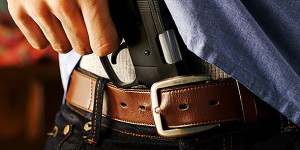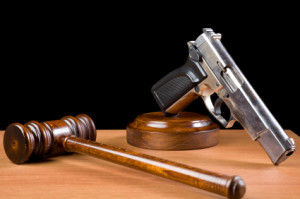Gun Laws/Weapon Charges
GUN LAWS (PENAL CODE SECTIONS 23500-34370)
As most people know, the Second Amendment to the United States Constitution preserves the individual’s right to possess firearms:
“A well-regulated militia, being necessary to the security of a free State, the right of the People to keep and bear arms, shall not be infringed”.
While this language is simple enough, there exists a network of laws in each state regulating the use and possession of firearms, from the size, type and power, to the ammunition, location and access to that firearm. The gun laws in California are among the toughest regulations in the nation.
Many Californians do not understand their legal rights and responsibilities when it comes to gun ownership. Gun ownership and possession is very tightly regulated by the State of California and, as is often the case with the tax code, it is often difficult to know if one is correctly following the law.
The gun laws in California are complex, encompassing hundreds of distinct code sections, some of which carry the potential for severe penalties. It is impossible to review all of the laws regulating the sale, possession, and use of firearms here.
If you find yourself charged with violating any of these statutes, you need to consult with a criminal defense attorney right away. Attorney Michael A. Fiumara is an experienced criminal defense attorney and I will defend your rights under the law. Our firm has seen many cases to a successful conclusion, including those in which a person is charged with violating one of the many gun law statutes in the State of California.

GUN OWNERSHIP AND POSSESSION
Contrary to popular belief, there is no requirement that a California resident who buys a gun in California must register that gun with the state. In effect, a gun legally purchased in California is already registered in the state’s database since a resident of California can buy a gun only from a licensed dealer (in most cases) and the information about the new gun owner and the gun are added to the state’s database. A new gun purchaser must also pass a written handgun safety test.
There is a ten-day waiting period before possession of a purchased gun may be taken. During this waiting period, the background of the gun purchaser is checked through the state database in order to make sure that person is legally entitled to possess a gun under the laws of California. If a gun is brought in from another state, the new resident must submit a New Resident Ownership Report to the California Department of Justice. As of January 1, 2014, this requirement applies to both long guns and hand guns.
There are many categories of persons who are not allowed to possess a gun in the State of California, including but not limited to:
Anyone who has been convicted of a felony or any violent offense;
Anyone who is ordered to not possess firearms as a condition of probation;
Anyone who has been convicted of a misdemeanor listed under Penal Code section 29805;
Most persons subject to a temporary or permanent restraining order or injunction;
Anyone who is found by a court to be a danger to himself, herself, or others because of a mental illness;
Anyone who is adjudicated to be a mentally disordered sex offender;
Anyone who is placed on a conservatorship because of a mental disorder or impairment due to chronic alcoholism;
Anyone who is taken into custody as a danger to self or others under Welfare and Institutions Code section 5150, assessed under Welfare and Institutions Code section 5151, and admitted to a mental health facility under Welfare and Institutions Code sections 5151, 5152, or certified under Welfare and Institutions Code sections 5250, 5260, and 5270.15;
Anyone who is addicted to the use of narcotics;
Anyone who receives a dishonorable discharge from the military; and
Anyone who is not legally residing in the United States.
Although there are some exceptions, in most cases it is illegal to possess automatic firearms, short-barreled shotguns and rifles (barrel length of less than 16″), assault weapons, .50 Browning machine gun caliber rifles, and large capacity magazines in California. All other firearms are, generally speaking, legal.
California utilizes a database known as the Armed Prohibited Persons System, which continually updates with those persons no longer eligible to possess firearms. For example, someone who has been committed on a “5150” may find the police knocking on the door because he or she legally bought a gun in the state at some time prior to his or her commitment.
The State is allowed to confiscate guns legally purchased by someone who subsequently becomes a person not allowed to possess a gun in the state. It is not unheard of for the police to confiscate guns, due to errors in the database, from persons who are actually allowed possession.
CARRYING OR TRANSPORTING A FIREARM
A person who legally possesses a concealable firearm in California may transport the firearm in a motor vehicle as long as the firearm is unloaded and stored in a fully enclosed, secure, and locked container. A trunk is considered such a container, but a glove compartment is not. A concealable firearm is any firearm capable of being concealed such as a pistol or revolver.
A non-concealable, legally owned firearm, such as a rifle, may be transported in a vehicle without the need to secure the firearm in an enclosed container. The firearm must be unloaded when being transported.
These are just the basics. There is a labyrinth of laws in California regulating where the guns may be stored, how the guns may be transported, concealed weapon regulations, and so on. Violation of any of these laws can result in criminal charges, from simply neglecting to file a “New Resident Ownership Report” (a misdemeanor with a potential penalty of up to six months in county jail and/or fines) to the sale or transfer of an assault weapon (which is a felony with a potential sentence of up to eight years imprisonment).
Anyone charged under the complicated gun statutes in California should consult with an experience criminal defense attorney immediately.

WEAPONS CHARGES
SALE, POSSESSION AND USE OF ASSAULT WEAPONS
The most common weapons charges fall under the category of the sale or possession of an illegal assault weapon or .50 BMG rifle. The sale and possession of these weapons is made illegal under Penal Code sections 30600-30675. There are some limited exceptions to the sale and possession of these weapons, which will not be discussed here.
SENTENCING
Someone charged with the illegal sale or transfer of an assault weapon or a .50 BMG rifle faces a felony charge punishable by imprisonment for four, six, or eight years. A person charged with simple possession of an assault weapon may be charged with a misdemeanor or a felony depending on the circumstances.
A misdemeanor assault weapons charge carries a potential sentence of imprisonment for up to one year and/or probation plus fines. If charged as a felony, the sentence is 16 months, two, or three years imprisonment plus a fine. Simple possession of a .50 BMG weapon is a misdemeanor with a penalty of up to one year imprisonment and/or probation plus fines.
SENTENCING ENHANCEMENTS
California law provides for sentencing enhancements for the possession or use of a gun during the commission of a felony. Possession of a simple handgun during the commission of any felony will trigger the sentencing enhancement statute with the minimum of an additional and consecutive term of one year imprisonment.
Consecutive means that the sentence will be added to, not served with, the sentence for the underlying crime. The enhancement penalties can be much more severe depending on the type of weapon used and the circumstances of the crime and can carry up to a life term under certain conditions.
Under Penal Code section 12022, a person who is armed with an assault weapon, a machine gun, or a .50 BMG weapon during the commission of a felony or an attempted felony faces an additional and consecutive term of imprisonment for three years.
Under certain circumstances, the enhancement is even greater. For example, someone charged with the sale or transport of drugs while personally armed with any of these weapons faces a sentencing enhancement of three, four, or five years imprisonment.
OTHER GUN CRIMES
There are many other laws in the State of California that make it criminal to use or possess a gun in certain areas or in certain ways.
Examples of gun crimes in California include, but are not limited to:
Bringing a gun on public or private school property, or even within 1000 feet of the school grounds, is an offense punishable by up to seven years imprisonment;
Carrying a concealed weapon without a permit is a misdemeanor with a sentence of up to one year in jail and/or fines;
Assault with a firearm carries stiffer penalties than simple assault. It is almost always charged as a felony (although assault with a simple revolver can be charged as a misdemeanor) and carries a sentence of up to twelve years imprisonment.
These examples are but a few of the many charges under California’s gun laws. The State of California often punishes gun crimes severely and if you find yourself charged under any of these statutes, you should consult immediately with Fiumara Law , PC today at 707-571-8600 OR 760-832-6118.
CONVEAT/ WARNING:
This is information is ONLY provided to you as a general explanation of the enormity and complexity of the firearms and weapons related offenses, enhancements and possible priors that each gun related case can present to the potential criminal defendant. Superimposed upon the complex and interlocking and overlapping laws, regulations and case law pertaining to this subject, each criminal case MUST be first evaluated by an experienced criminal defense attorney before rendering an opinion as to your specific case. It is imperative for the Attorney to first KNOW all of the facts and criminal history from the defendant before the attorney can be expected to provide a legal opinion as to how much jail or prison exposure is possible under California’s very strict gun laws. Each case needs to be carefully evaluated on its own merits. We don’t practice cookie cutter law and not one shoe fits all! Therefore, you are encouraged to make an appointment with any one of the experienced Criminal Defense Attorneys at Fiumara Law , PC for a free and confidential consultation.

